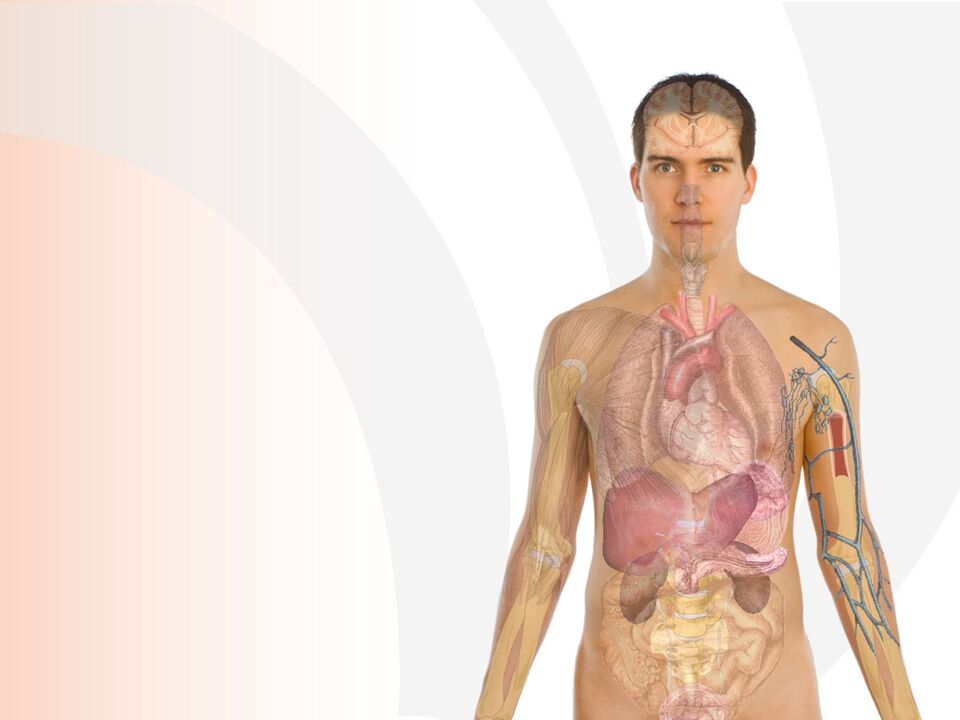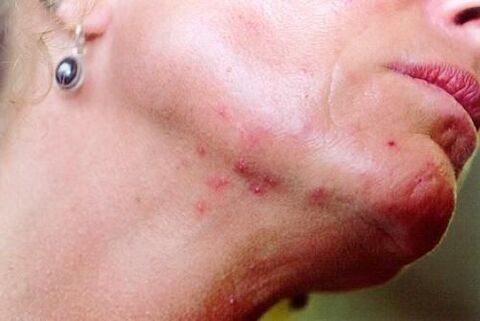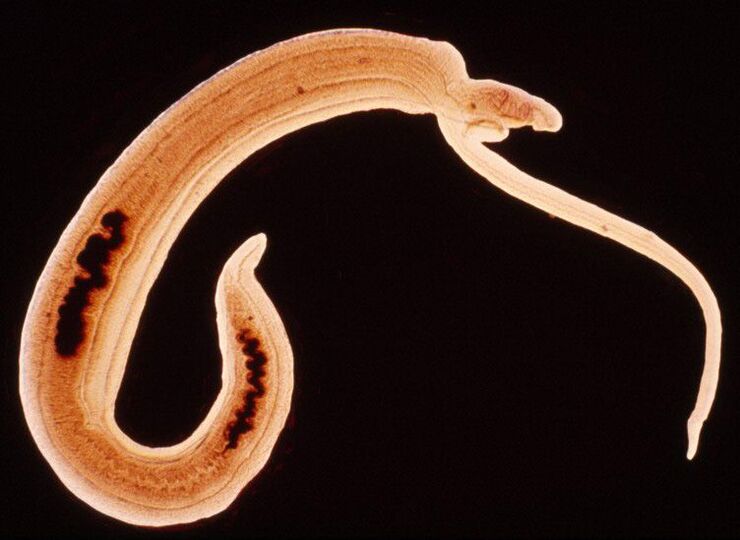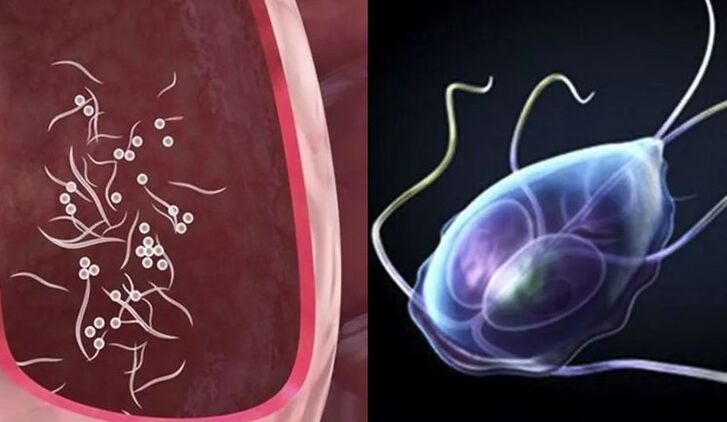The symptoms of a worm infection are different. For example, indigestion disorders occur most often - nausea, vomiting, pain and abdominal bloating. Some patients don't notice these signs until they develop a rash that doesn't go away with conventional medicines. Often, worm invasions are accompanied by symptoms similar to other diseases and allergies. Therefore, prompt diagnosis is required.

Human infection with worms
Most worms spread to humans by eating unwashed fruits and vegetables. After spreading throughout the body, organ damage can occur, leading to serious illness. Lesions of the liver, kidneys, heart, digestive tract, gallbladder and even tumors can develop.
Common characteristic symptoms are skin irritation, rash. But a person may not notice this for years, as the pathology develops, although taking a course of deworming medication is enough for a full recovery.
Infection method
There are 4 ways worms can spread to the human body:
- soil worm disease. The parasites enter and spread into the water through soil residues on unwashed fruits and vegetables. In addition, improper hand washing after working on the ground can also be infected. Animals entering the house with dirty paws were frequently observed in contact with the ground. Eggs, larvae, and adults can enter the human body.
- touch. In the host, the female lays 4-5 thousand eggs in 1 day. They can spread from an infected person to others after exposure, especially at home. Eggs or adults are spread through bedding, towels, personal hygiene products. It is enough that an infected person does not wash their hands. In most cases, this path is characteristic of pinworms, worms.
- biological helminthiasis. Parasites are stored in the body of live and dead animals, fish. Subsequently, a person can eat them. Preservation of parasites was observed with insufficient heat treatment.
- insect bites. In this way, the smallest sized worm eggs are spread.
Of all forms of helminth, infection is most common with ingestion of eggs and larvae. They can be found in soil, water, on infected people, and in raw meat. It is important not only to wash food and hands, but to always heat-treat food.

Symptoms of Helminthosis
Symptoms of infection vary depending on the stage of the disease.In most cases, the following symptoms occur:
- weight loss, weight loss;
- pale skin;
- Anal itching.
Symptoms are similar to other conditions, so patients may be using the wrong treatment. Symptoms may vary depending on the affected body part. For example, with liver damage, yellowing of the skin can occur.
Gastrointestinal dysfunction
As pathogens invade the digestive tract, symptoms such as:
- Violation of the formation of fecal lumps (constipation, diarrhea);
- anal itching;
- indigestion--nausea, vomiting, abdominal pain, heartburn;
- colic;
- flatulence, accompanied by swelling;
- Cyclical changes in body weight from large to small.
In the early stages, symptoms are almost invisible. The more damage the worms do to internal organs, the more active the signs. Some parasites are able to secrete waste products that are foreign to the body. This can lead to severe poisoning and diarrhea. Large worms spread throughout the intestines, preventing feces from passing through. This can lead to constipation.
A person can suffer severe poisoning due to the release of worm waste. This is why weakness, malaise, indigestion disorders occur.
Immunosuppressive
When a person consumes food, nutrients enter the body and are distributed throughout the tissues.Worms will eat them, so patients will experience the following deviations:
- vitamin deficiency;
- metabolic diseases;
- Suppresses the immune system.
A person often begins to suffer from viral, viral, fungal diseases. Even with a multivitamin preparation, vitamin deficiencies will not be eliminated until deworming treatment is complete.
Nervous system disease
Certain types of worms can damage peripheral tissues of the nervous system and cross the blood-brain barrier. These properties are possessed by the products of their poisoning.Damage to the nervous system can cause symptoms such as:
- Frequent forgetfulness, poor memory;
- headache to migraine;
- Dizziness;
- stress, neurosis, depression;
- Increase fatigue.
The patient's behavior changes. He clashed with those around him and forgot his acquaintances. Gradually, the symptoms were replenished, and the body temperature rose above 39 degrees.

Chronic vitamin deficiency can lead to chronic fatigue syndrome. Gradually, red blood cell levels decrease, leading to anemia. The person becomes irritable and aggressive.
Respiratory diseases
Even in the initial stages, damage to the deepest parts of the respiratory tract can occur.The following pathological development:
- tracheitis, bronchitis;
- Emphysema, bronchial asthma, pneumonia.
Signs of a worm invasion may even be frequent rhinitis and pharyngitis.
skin problems
Adequate amounts of vitamins, trace elements and minerals are required for the proper development of the epidermis. Worm infections can lead to vitamin deficiencies, so skin quality can suffer.The following deviations occur:
- acne, acne, rash;
- itching, peeling, redness of the epidermis;
- The nail plate is peeling off.
Even the most severe skin diseases can develop:
- hives, dermatitis;
- papilloma, seborrhea;
- Allergic reaction.
Doctors and patients may not immediately understand why the drug is not helping these conditions. The quality of the skin deteriorates significantly, it becomes pale, and wrinkles appear. The turgor pressure decreases, that is, the surface tension.

Signs of infection depend on the type of worm
The severity of symptoms depends on the following factors:
- the number of internal parasites;
- degree of immune activity;
- localization of parasites;
- a parasite.
Some worms can stay in the host for a long time without causing negative symptoms. Others can immediately deteriorate health and damage the liver. such as roundworms.
roundworms
Ascaris can damage many internal organs, causing certain symptoms similar to other diseases.The following symptoms may occur:
- hyperthermia;
- prolonged cough;
- severe fatigue;
- Bronchitis, pneumonia.
First of all, the digestive tract is damaged, thus forming vitamin deficiencies and metabolic disorders. The human body is exhausted.Gradually develop signs of gastrointestinal damage:
- yellowing of the skin;
- intestinal obstruction.
Severe headaches, migraines, and depressive states occur as the worms spread across the blood-brain barrier.
Schistosomiasis, Trichuris, Ankylosis, Dilobites
Parasites cause the following deviations:
- lack of nutrients and vitamins;
- Decreased metabolism, leading to weight changes;
- Intestinal flora imbalance.
Gradually, the vitamin deficiency turns into athlete's foot, causing serious consumption of the body. A person's skin becomes pale and he often faints, typical of anemia.
pinworm
Pinworms are characterized by the deposition of eggs in the anus, usually at night. Therefore, people are concerned about severe itching of the anus. The disease is characterized by periodic remissions, so sometimes the itching stops. Without treatment, worm infestations can become widespread, so itching can be a concern for patients at any time of the day.
Trichinosis
The parasite penetrates any part of the body, producing a large amount of toxins. This can lead to constant cramping, cramping, and muscle pain. Edema develops due to damage to the cardiovascular system. In severe poisoning, the body temperature will rise.
Fascioliasis, Epinorchiasis, Clonorchiasis
This is one of the most dangerous worms and causes the following lesions:
- liver difficulties with the development of jaundice;
- Intestinal obstruction, dyspepsia when it spreads along the gastrointestinal tract.
Gradually, the patient develops hepatosplenomegaly.
Urogenital schistosomiasis

The parasite is actively transmitted through the genitourinary system. Mucosal damage occurs due to chronic inflammatory processes. Therefore, when urinating, a person detects red urine, indicating the development of bleeding foci.
worm habitat
In humans, worms damage different types of organs:
- vlasoglav - large intestine;
- Roundworms, tapeworms, hookworms - small intestine;
- Ascaris - Liver.
Depending on the damaged organ, different symptoms develop:
- Liver - jaundice, pain in the right flank, hepatitis;
- respiratory tract - trachea, bronchitis, pneumonia;
- Brain - convulsions, paresthesias, fainting.
It is necessary to simultaneously treat diseases (hepatitis, colitis), eliminate worms.

common worm
Scientists counted the large number of parasites found in the human body. There are more than 100 in total.But more often, doctors will differentiate the infection from the following parasites:
- pinworm;
- Dwarf tapeworm;
- tapeworm;
- hookworm;
- whipworm;
- paragonimiasis;
- Cysticercosis.
To determine the exact type of pathogen and prescribe the correct treatment, laboratory and instrumental diagnosis is required. First, the therapist examines the patient, then he uses the stool for a co-procedure, which is the detection of worm eggs. Typically, therapists and infectious disease specialists recommend two studies because eggs and larvae may go undetectable even when an infection is present.
Laboratory blood tests are recommended for at-risk patients:
- the presence of pets;
- work with animals;
- Medical workers;
- employees of children's educational institutions;
- food workers.
attention! For accurate identification of helminths and their poisoning products, enzyme-linked immunosorbent assays are recommended. It is performed in municipal clinics and hospitals as well as in private laboratories.
treatment method
Antihelminthic drugs alone are contraindicated because they strongly affect the state of the liver and kidneys. An initial examination is recommended, followed by prescribing specific medications. The dose is selected according to the person's health, age, and weight.
Choose from the following methods of administration:
- Tablets - mild or moderate helminthiasis;
- Injections, infusions - the severity of the disease, the formation of excessive parasites, serious damage to the digestive tract.
Many medicines only work in adults. If there is a risk of eggs and larvae, it is better to undergo a second course of treatment or opt for a more effective remedy.
This table shows the best medicines for treatment.
| substance | Influence |
| Mebendazole | Completely kills pinworms, hookworms, whipworms, tapeworms and other parasites |
| pitaya | The substance destroys roundworms and is effective against ascariasis and necrosis |
| Levamisole hydrochloride | Eliminate roundworms and hookworms |
| pilvinia | Helps to completely cure enterobiasis |
| albendazole | It helps destroy most elements at the adult or larval stage. |
Initially, it is recommended to identify the exact pathogen before applying the drug. This will increase the chances of recovery without negatively affecting the body.
Prevention method
To prevent parasites from entering the body, use the precautionary rule:
- Wash hands after returning home, throughout the day, and after contact with animals;
- Personal hygiene products and tableware can only be used by one person;
- Take multivitamins, quit bad habits, and strengthen your immune system;
- Thoroughly wash fruits and vegetables, heat-treating meat and fish;
- Use high-quality drinking water from reliable sources.

Many products contain worms, so the risk of them spreading into the body cannot be ruled out. Anyone can get parasites without knowing it. It can be spread from one family member to others through household contact. Therefore, it is necessary to take preventive measures every day.
Taking good care of animals is important. They need to be washed regularly and given parasite medication to reduce the risk of helminth infection.
If anyone suspects that he has been accused of having a worm infection, it is best to get a laboratory test done promptly. Repeat twice to avoid false negative tests. Self-medication is prohibited. They are both effective and have a negative effect on the liver. Only a doctor can choose the best repellent with the correct dose. If treated promptly, it can prevent the development of serious diseases, immune deficiencies.

























